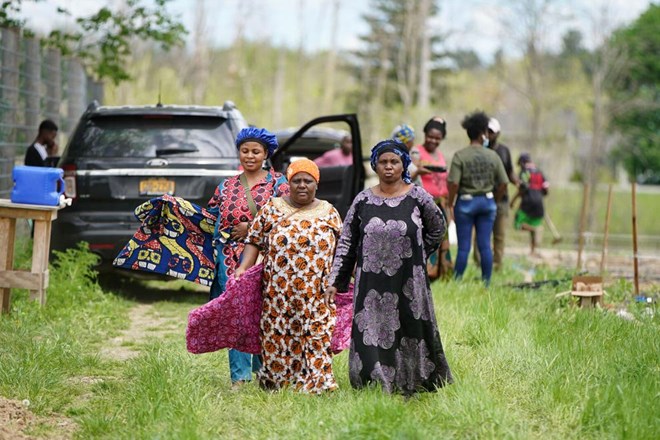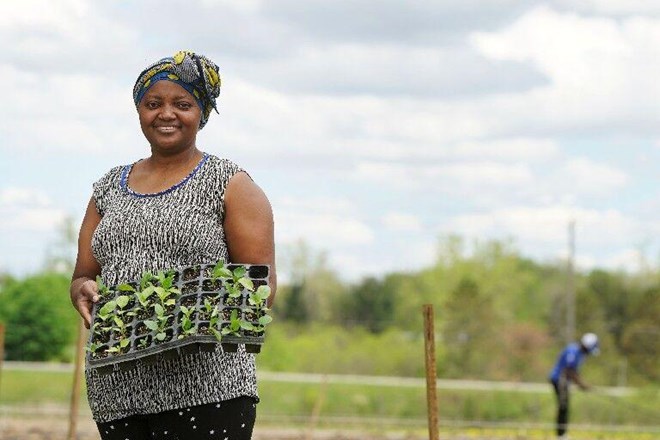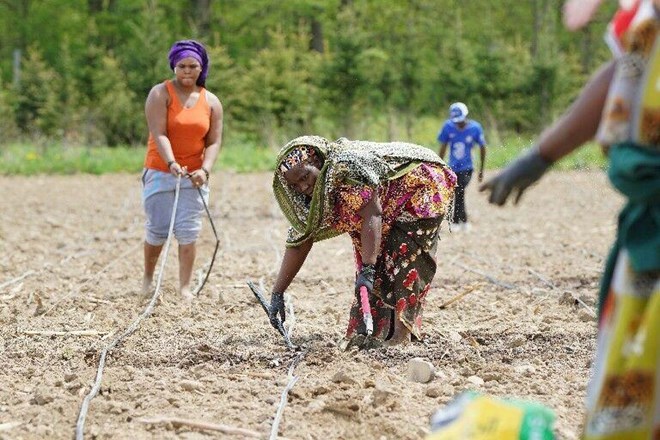
Saturday June 4, 2022

On a recent Saturday, Immaculee Ndayisaba was busy
transplanting eggplants into rows on cultivated land in Orchard Park.
Ndayisaba, from Burundi, was also planting tomatoes, hot
peppers and corn – native plantings she farmed in Africa before fleeing to the
United States as a refugee 20 years ago.
On 37 acres of farmland leased by the Providence Farm
Collective, Ndayisaba and others from nine ethnic groups get a chance to return
to their roots, grow fresh produce and earn income.
"We're thankful PFC gives us somewhere to remind
ourselves where we come from, and somewhere to be able to come and gather
together," Ndayisaba said.
The community plots are a godsend for the refugees and
immigrants, the majority of whom live on Buffalo's West Side, said Hamadi Ali,
the market's manager.
Ali, a member of the Somali Bantu community, spent a decade
at a refugee camp in Kenya before emigrating to Buffalo, where he earned a
master's degree in economics from the University at Buffalo.
The Providence Farm Collective hopes to make the farmland
permanently available, and it is partnering with the Western New York Land
Conservancy to purchase the farmland and preserve the land in perpetuity.
The farmland costs $507,000, with other costs including a
fund set up for longtime stewardship of the property, farmer-directed funds, a
conservation easement and facility needs such as a barn and pavilion.

Immaculee Ndayisaba holds a flat of intore plants (African eggplant) at the Providence Farm Collective in Orchard Park Saturday, May 14, 2022.
The two organizations have embarked on a capital campaign
and hope to raise $2.3 million by Dec. 31.
Bigger harvest
The farm collective began as a project of the Somali Bantu
community in 2017 at the Providence Farm, a horse farm in East Aurora owned by
Dr. Christopher Kerr. They farmed on 9 acres.
The move to Orchard Park came in April 2021. This year, more
than 300 people are expected to farm the land, with the number of small farm
incubators increasing to 21 thanks to the quadrupling of acres now available.
The incubators are part of a three-year educational program
through the U.S. Department of Agriculture. Farmers are given a quarter of an
acre, sometimes more, of fertilized and plowed farmland with access to hand
tools, seeds and agricultural and marketing training.
Hawa Mohamed, a Somali Bantu who grows peppers she calls
"pepperoni," collard greens, scallions and maize, earns income from
the sale of produce she grows.
Business education is offered by WEDI, which started the
West Side Bazaar featuring immigrant and refugee food and clothing vendors.
Cornell Cooperative Extension provides farming education. There are also 26
workshops on business and farming, interpreted in several languages.
Ali helps connect farmers with sales opportunities for their
vegetables.
Support Local Journalism
A demonstration farm plot for training purposes and a summer
youth employment program are also offered.
Providence Farm Collective's long-term goal is to teach
people to find farmland in rural communities to start a small farming business,
or to form a cooperative, said Kristin Heltman-Weiss, the executive director.

Rehema Misago works with some irrigation hoses at the Providence Farm Collective in Orchard Park.
Mark Mulville / Buffalo News
In 2020, farmers harvested 23,000 pounds of produce among 27
varieties of crops. Last year, the harvest increased to 90,000 pounds.
For the first time, beginning on July 2, seasonal produce
grown on the plots of land will be sold from 10 a.m. to 1 p.m. on Saturdays
through October at the PFC Farmers Market on the West Side, in the M&T Bank
parking lot at 130 Grant St.
The Providence Farm Collective received a $477,000 grant
from the USDA, allowing the farmers market to operate. The mixed racial
neighborhood includes immigrants and refugees from Somalia, Democratic Republic
of Congo, Burundi, Ethiopia, Burma and Liberia.
'Natural food from
the farmer'
Ntizimpa Therence, a Burundi immigrant, was using a large
hoe to break up clods of dirt before planting corn. It is the third year in a
row he has farmed with Providence Farm Collective.
"Here, we grow food that is very natural, and doesn't
have chemicals," Therence said. "In my country, according to my
culture, we ate natural food from the farmer."
Therence was preparing to plant beans, red and white onions,
eggplants, red peppers and cucumbers.
Nelson Nagbe, who fled his native Liberia to come to Jacksonville
in 2003 and Buffalo six years later, also grows a variety of native foods.
There's African eggplant known as "bitter ball;"
the bitter-tasting kittley – a pea eggplant believed to have medicinal value;
hot peppers; okra; pinto beans; and sweet potatoes.

Farmers from the Democratic Republic of Congo walk through the fields at the Providence Farm Collective in Orchard Park Saturday, May 14, 2022.
Mark Mulville/Buffalo News
"I really did miss it," Nagbe said. "PFC has
brought us to a place where we remember what we used to do and what our parents
taught us."
Mahamud Mberwa, a Somali Bantu and one of the Providence
Farm Collective's founders, imports African maize seeds from Tanzania, making
the farm "pretty much the only place in New York State that grows so much
of it," Heltman-Weiss said.
It is sold as far south as Charlotte, N.C., as far west as
Columbus, Ohio, and Utica to the east, she said.
The farming experience has meant a lot to him on many
levels, said Mberwa, who grew up in a Kenyan refugee camp at age 10 after war
broke out in Somalia.
He enjoys learning about farming from community elders and
Americans. He likes helping instruct other farmers and the chance to work with
people of different ethnicities.
"Farming is beautiful," Mberwa said. "I enjoy
it very much. It makes me very happy here working with the different
cultures."
For more information, go to providencefarmcollective.org.